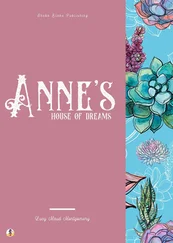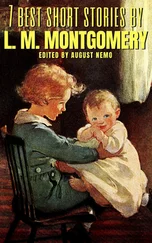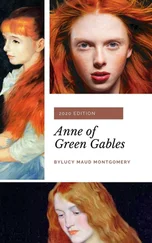Lucy Montgomery - Lucy Maud Montgomery Short Stories
Здесь есть возможность читать онлайн «Lucy Montgomery - Lucy Maud Montgomery Short Stories» весь текст электронной книги совершенно бесплатно (целиком полную версию без сокращений). В некоторых случаях можно слушать аудио, скачать через торрент в формате fb2 и присутствует краткое содержание. Жанр: Детская проза, на английском языке. Описание произведения, (предисловие) а так же отзывы посетителей доступны на портале библиотеки ЛибКат.
- Название:Lucy Maud Montgomery Short Stories
- Автор:
- Жанр:
- Год:неизвестен
- ISBN:нет данных
- Рейтинг книги:5 / 5. Голосов: 1
-
Избранное:Добавить в избранное
- Отзывы:
-
Ваша оценка:
- 100
- 1
- 2
- 3
- 4
- 5
Lucy Maud Montgomery Short Stories: краткое содержание, описание и аннотация
Предлагаем к чтению аннотацию, описание, краткое содержание или предисловие (зависит от того, что написал сам автор книги «Lucy Maud Montgomery Short Stories»). Если вы не нашли необходимую информацию о книге — напишите в комментариях, мы постараемся отыскать её.
Lucy Maud Montgomery Short Stories — читать онлайн бесплатно полную книгу (весь текст) целиком
Ниже представлен текст книги, разбитый по страницам. Система сохранения места последней прочитанной страницы, позволяет с удобством читать онлайн бесплатно книгу «Lucy Maud Montgomery Short Stories», без необходимости каждый раз заново искать на чём Вы остановились. Поставьте закладку, и сможете в любой момент перейти на страницу, на которой закончили чтение.
Интервал:
Закладка:
Grandma looked in the basket for her handkerchief. It was not there. She looked on the floor and on the seat and under the seat. It was not there. She stood up and shook herself—still no handkerchief.
"Dear, oh dear," exclaimed Grandma wildly, "I've lost my ticket—I always knew I would—I told Cyrus I would! Oh, where can it be?"
The conductor scowled unsympathetically. The dark man got up and helped Grandma search, but no ticket was to be found.
"You'll have to pay the money then, and something extra," said the conductor gruffly.
"I can't—I haven't a cent of money," wailed Grandma. "I gave it all to Cyrus because I was afraid my pocket would be picked. Oh, what shall I do?"
"Don't worry. I'll make it all right," said the dark man. He took out his pocketbook and handed the conductor a bill. That functionary grumblingly made the change and marched onward, while Grandma, pale with excitement and relief, sank back into her seat.
"I can't tell you how much I am obliged to you, sir," she said tremulously. "I don't know what I should have done. Would he have put me off right here in the snow?"
"I hardly think he would have gone to such lengths," said the dark man with a smile. "But he's a cranky, disobliging fellow enough—I know him of old. And you must not feel overly grateful to me. I am glad of the opportunity to help you. I had an old grandmother myself once," he added with a sigh.
"You must give me your name and address, of course," said Grandma, "and my son—Samuel Sheldon of Midverne—will see that the money is returned to you. Well, this is a lesson to me! I'll never trust myself on a train again, and all I wish is that I was safely off this one. This fuss has worked my nerves all up again."
"Don't worry, Grandma. I'll see you safely off the train when we get to Green Village."
"Will you, though? Will you, now?" said Grandma eagerly. "I'll be real easy in my mind, then," she added with a returning smile. "I feel as if I could trust you for anything—and I'm a real suspicious person too."
They had a long talk after that—or, rather, Grandma talked and the dark man listened and smiled. She told him all about William George and Delia and their baby and about Samuel and Adelaide and Cyrus and Louise and the three cats and the parrot. He seemed to enjoy her accounts of them too.
When they reached Green Village station he gathered up Grandma's parcels and helped her tenderly off the train.
"Anybody here to meet Mrs. Sheldon?" he asked of the station master.
The latter shook his head. "Don't think so. Haven't seen anybody here to meet anybody tonight."
"Dear, oh dear," said poor Grandma. "This is just what I expected. They've never got Cyrus's telegram. Well, I might have known it. What shall I do?"
"How far is it to your son's?" asked the dark man.
"Only half a mile—just over the hill there. But I'll never get there alone this dark night."
"Of course not. But I'll go with you. The road is good—we'll do finely."
"But that train won't wait for you," gasped Grandma, half in protest.
"It doesn't matter. The Starmont freight passes here in half an hour and I'll go on her. Come along, Grandma."
"Oh, but you're good," said Grandma. "Some woman is proud to have you for a son."
The man did not answer. He had not answered any of the personal remarks Grandma had made to him in her conversation.
They were not long in reaching William George Sheldon's house, for the village road was good and Grandma was smart on her feet. She was welcomed with eagerness and surprise.
"To think that there was no one to meet you!" exclaimed William George. "But I never dreamed of your coming by train, knowing how you were set against it. Telegram? No, I got no telegram. S'pose Cyrus forgot to send it. I'm most heartily obliged to you, sir, for looking after my mother so kindly."
"It was a pleasure," said the dark man courteously. He had taken off his hat, and they saw a curious scar, shaped like a large, red butterfly, high up on his forehead under his hair. "I am delighted to have been of any assistance to her."
He would not wait for supper—the next train would be in and he must not miss it.
"There are people looking for me," he said with his curious smile. "They will be much disappointed if they do not find me."
He had gone, and the whistle of the Starmont freight had blown before Grandma remembered that he had not given her his name and address.
"Dear, oh dear, how are we ever going to send that money to him?" she exclaimed. "And he so nice and goodhearted!"
Grandma worried over this for a week in the intervals of looking after Delia. One day William George came in with a large city daily in his hands. He looked curiously at Grandma and then showed her the front-page picture of a man, clean-shaven, with an oddly shaped scar high up on his forehead.
"Did you ever see that man, Mother?" he asked.
"Of course I did," said Grandma excitedly. "Why, it's the man I met on the train. Who is he? What is his name? Now, we'll know where to send—"
"That is Mark Hartwell, who shot Amos Gray at Charlotteville three weeks ago," said William George quietly.
Grandma looked at him blankly for a moment.
"It couldn't be," she gasped at last. "That man a murderer! I'll never believe it!"
"It's true enough, Mother. The whole story is here. He had shaved his beard and dyed his hair and came near getting clear out of the country. They were on his trail the day he came down in the train with you and lost it because of his getting off to bring you here. His disguise was so perfect that there was little fear of his being recognized so long as he hid that scar. But it was seen in Montreal and he was run to earth there. He has made a full confession."
"I don't care," cried Grandma valiantly. "I'll never believe he was all bad—a man who would do what he did for a poor old woman like me, when he was flying for his life too. No, no, there was good in him even if he did kill that man. And I'm sure he must feel terrible over it."
In this view Grandma persisted. She never would say or listen to a word against Mark Hartwell, and she had only pity for him whom everyone else condemned. With her own trembling hands she wrote him a letter to accompany the money Samuel sent before Hartwell was taken to the penitentiary for life. She thanked him again for his kindness to her and assured him that she knew he was sorry for what he had done and that she would pray for him every night of her life. Mark Hartwell had been hard and defiant enough, but the prison officials told that he cried like a child over Grandma Sheldon's little letter.
"There's nobody all bad," says Grandma when she relates the story. "I used to believe a murderer must be, but I know better now. I think of that poor man often and often. He was so kind and gentle to me—he must have been a good boy once. I write him a letter every Christmas and I send him tracts and papers. He's my own little charity. But I've never been on the cars since and I never will be again. You never can tell what will happen to you or what sort of people you'll meet if you trust yourself on a train."
The Romance of Jedediah
Jedediah was not a name that savoured of romance. His last name was Crane, which is little better. And it would be no use to call this story "Mattie Adams's Romance" because Mattie Adams is not a romantic name either. But names have really nothing to do with romance. The most exciting and tragic affair I ever knew was between a man named Silas Putdammer and a woman named Kezia Cullen—which has nothing to do with the present story.
Jedediah, to all outward seeming, did not appear to be any more romantic than his name. He looked distinctly commonplace as he rode comfortably along the winding country road that was dreaming in the haze and sunshine of a midsummer afternoon. He was perched on the seat of a bright red pedlar's wagon, above and behind a dusty, ambling, red pony of that peculiar gait and appearance pertaining to the ponies of country pedlars—a certain placid, unhasting leanness, as of a nag that has encountered troubles of his own and has lived them down by sheer patience and staying power. From the bright red wagon proceeded a certain metallic rumbling and clinking as it bowled along, and two or three nests of tin pans on its flat rope-encircled top flashed back the light so dazzlingly that Jedediah seemed the beaming sun of a little planetary system all his own. A new broom sticking up aggressively at each of the four corners gave the wagon a resemblance to a triumphal chariot.
Читать дальшеИнтервал:
Закладка:
Похожие книги на «Lucy Maud Montgomery Short Stories»
Представляем Вашему вниманию похожие книги на «Lucy Maud Montgomery Short Stories» списком для выбора. Мы отобрали схожую по названию и смыслу литературу в надежде предоставить читателям больше вариантов отыскать новые, интересные, ещё непрочитанные произведения.
Обсуждение, отзывы о книге «Lucy Maud Montgomery Short Stories» и просто собственные мнения читателей. Оставьте ваши комментарии, напишите, что Вы думаете о произведении, его смысле или главных героях. Укажите что конкретно понравилось, а что нет, и почему Вы так считаете.












